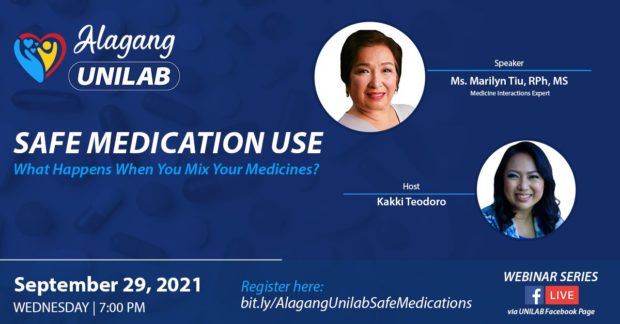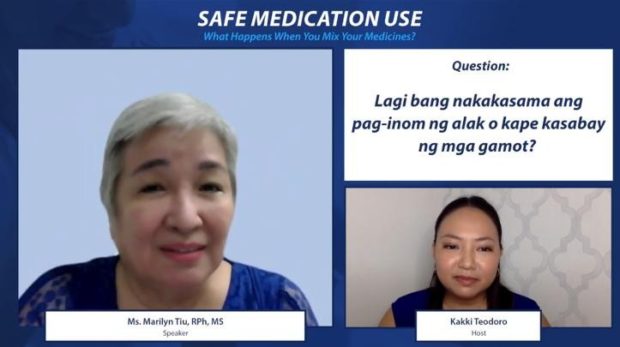Alagang Unilab shares tips on Food and Drugs Interaction
Have you ever wondered why doctors would sometimes prescribe you multiple medicines to be taken at certain hours of the day? Or when your physician would specifically instruct you not to take your meds with any citrus fruit juices. And why is it a cardinal rule not to drink any alcoholic beverage when under medication?
These and more were discussed at the recent ‘Alagang UNILAB’ webinar series dubbed “Safe Medication Use: What Happens When You Mix Your Medicine?” Developed to help Filipinos find ways to be healthier physically, emotionally, and mentally through education, Alagang UNILAB invited registered pharmacist and medicine interactions expert, Marilyn Y. Tiu, RPh, MS, to shed light on the topic.
Medicine at work
According to Tiu, there are different ways to take medicines, but the most common is orally or by swallowing. Once ingested, it goes through the process of absorption and distribution. The digestive juices in the stomach breaks down the drug before it passes through the bloodstream and the tissues to take effect. At some point, it will pass through the liver for metabolism and excretion.
The doctor’s prescribed dosage and time of medicine intake play a crucial role in these processes lest the patient runs the risk of being underdosed or overdosed, both effects of which are not good for the body.
“Doctors and pharmacists always put the patient’s safety in mind when prescribing or dispensing medication. Kaya hindi basta-basta iniinom ang gamot. Kailangan maingat tayo,” initiated Tiu who is also the former chairman of the Professional Regulation Commissions Board of Pharmacy.
Drug interactions
Based on how the medicine works in the body, Tiu gave a rundown of reasons why mixing medicine is a bad idea. “Mixing medicines, whether it is with another medicine, with alcohol, or with food, has the potential to affect the four processes. Sometimes, absorption slows down because it takes a longer time for the drug to reach the tissues. In turn, this will delay the effect of the drug in the body. Slower metabolism, on the other hand, can result in delayed excretion and when this happens, your succeeding doses get accumulated inside the body which could be more than the safe dose.”
Meanwhile, the mixture of alcoholic beverages and medicine makes the metabolism work overtime. This means the body eliminates the drug before it can get the maximum benefit. Some of the medications that should never be mixed with alcohol are those that are for allergy, cold, and flu medicine like loratadine, diphenhydramine, and cetirizine. When these substances are combined with alcoholic beverages, the effects, like drowsiness, are intensified.
Citrus fruits like grapefruit, calamansi, dalandan, and pomelo are also well-known to cause interaction with medicine because of the chemicals in the fruit that interfere with the enzymes in the digestive system. The same can be said about green leafy vegetables that are high in vitamin K as it affects medicine that thins the blood.
“An antacid can affect the rate of absorption of some drugs. So it is possible that it can delay the effect of these drugs because of slower absorption. Therefore, it will take a longer time to take effect. So, if you are taking maintenance medicine or antibiotics, it is better not to take them at the same time that you are taking your antacid,” said Tiu.
Multivitamins with minerals are also not to be taken with dairy products such as milk and cheese, according to Tiu. Research has shown that calcium in dairies can inhibit the body’s ability to absorb iron.
Ask your doctor
There are many other types of drug interactions according to Tiu and some of them may cause possible serious effects like liver or kidney damage, internal bleeding, or sometimes it can alter your cardiac function, your blood pressure, or your respiratory functions. To prevent these conditions, Tiu stressed the importance of following the instructions of doctors or pharmacists. “Always tell your doctor or your pharmacist about the other drugs that you are taking. Usually, they will ask so always be honest in telling your doctor of other medications that you are taking, other dietary supplements for example.
If possible, make a list of the medicines you are taking in case you’ll have a need to provide the information right away.
Tiu also recommended reading the label of your medicine. Check the generic name and check for special precautions. Do not self-medicate and do not use medicines that are prescribed for others.
Lastly, Tiu encouraged everyone to talk to a pharmacist when buying medicine. “The pharmacist is there to explain to you anything about the medicines that you are taking. They will tell you if there is any precaution that you need to take care of. And if you’re taking two or more drugs at the same time, all the more reason to talk to them and ask if there are any drug interactions.
Learn more about drug interactions and reasons why you should never mix your medicine by logging on to Unilab’s Facebook page (https://www.facebook.com/Unilab). You may also watch the webinar by clicking here (https://www.facebook.com/Unilab/videos/401784178178678)
Alagang Unilab webinar health series is UNILAB’s online advocacy aimed at educating the general public on staying healthy amid the pandemic. Watch out for more of the Alagang Unilab health series on UNILAB’s Facebook page.
Read more Business stories:
Ayala Land clinches multiple wins in the 2021 Titan Awards
M Lhuillier signs partnership agreement with Lucky 8 Star Quest, Inc.
Innovative and secure payment solutions for a cashless Philippines

